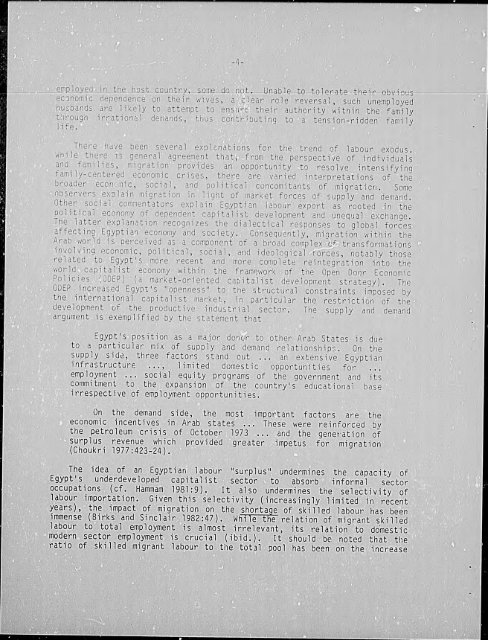FAMILIAL ADAPTATIONS TO THE INTERNATIONALIZATION OF ...
FAMILIAL ADAPTATIONS TO THE INTERNATIONALIZATION OF ...
FAMILIAL ADAPTATIONS TO THE INTERNATIONALIZATION OF ...
You also want an ePaper? Increase the reach of your titles
YUMPU automatically turns print PDFs into web optimized ePapers that Google loves.
-4-<br />
e .loyed, inte ehscoun ty,someido.-not ... Unab e to -to1erate their-obv hus-<br />
economic dependence on their wives, a clear role reversal, such unemployed<br />
husbands are ikely to attempt to ensu,: their authority within the -family<br />
through irrational demands-, thus contributing to a tension-ridden family<br />
life.<br />
There hdve been several explanations for the trend of labour exodus.<br />
While there is general agreement that, from the perspective of individuals<br />
and families, migration" provides an opportunity to resolve intensifying<br />
family-centered economic crises, there are varied interpretations of, the<br />
broader economic, social, and political concomitants of migration. Some<br />
observers explain migration in light of market forces of supply and demand.<br />
Other sociai commentators explain Egyptian labour export as rooted in the<br />
political economy of dependent capitalist development and unequal exchange.<br />
Th'e latter explanation recognizes the dialectical responses to global forces<br />
affecting Egyptian economy and society. Consequently, migration within the<br />
Arab world is perceived as a component of a broad complex. df transformations ,<br />
involving economic, political, social, and ideological iorces, notably those<br />
related to Egypt's more recent and more complete reintegration into the<br />
world capitalist economy within the framework -,of the Open Door Economic<br />
Policies IODEP) (a market-oriented capitalist development strategy). The<br />
ODEP increased Egypt's "openness" to the structural constraints imposed by<br />
the international capitalist market, in, particular the restriction of the .<br />
development of the productive industrial sector. The supply and demand<br />
argument is exemplified by the statement that<br />
Egypt's position as a major donfr to other Arab States is due<br />
to a particular mix of supply and demand relationships. On the<br />
supply side, three factors stand out ...- an extensive Egyptian<br />
infrastructure ...., limited domestic opportunities for ...<br />
empIloyment ... social equity programs of the government and its<br />
commitment to the "expansion of the country's educational base<br />
irrespective of employment opportunities.<br />
, On the demand side, the most important factors<br />
economic<br />
are<br />
incentives<br />
'the<br />
in Arab states .... These were reinforced by<br />
the petroleum crisis of October 1973 ... and the generation of<br />
'surplus revenue which provided greater impetus for migration<br />
(Choukri' 1977:423-24)".<br />
The idea of an Egyptian labour "surplus",-, undermines. the. capacity of<br />
Egypt's underdeveloped capitalist. sector to absorb informal sector<br />
~'~'~' occupations ;(cf. 'Hammam' 198,1:9). -It also' undermines the iselectivity~of<br />
labour importation. Given this selectivity (increasingly limited in recent,<br />
~~ years),zh mpact of 'migrat-ion on 'the, shortage of skilled labour has been<br />
~~ -immense..(Birks Vand Sinclair) 1982:0). While 5 e relation of migrant skilled<br />
~ aouto total employment "'is almost irrelevant, its relation to domestic<br />
~2~V~;~mderl secto emlyeti rucial (bd.. It should be noted that<br />
ra~oo<br />
the<br />
kle migrant labour to the total pool' 'has been on-they increase<br />
. ....."'V• g '...ṗ<br />
r~'~';'V~VV V~"'V Vj '~ ~ '','~<br />
V'
















